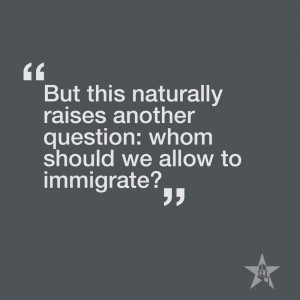In 1892, Annie Moore became the first immigrant to cross the threshold of Ellis Island and soon came to symbolize the 12 million immigrants who entered America between 1892 and 1954. Since then, millions of other people like her have immigrated to America in the hopes of attaining a better life.
But the Commission on Immigration Reform has concluded that the number of legal immigrants is too high, leaving us with the question of how to deal with the Annie Moores of today – a difficult but important question for Christians to consider.
 Unfortunately, as Drs. Mark Amstutz and Peter Meilaender explain in “Public Policy and the Church: Spiritual Priorities,” “Christian groups have become somewhat noteworthy for issuing unhelpful statements” about this topic. Many Christians argue for an open-door policy loosely based on biblical passages about migration, hospitality and human dignity without due consideration of the differences between biblical culture and our own.
Unfortunately, as Drs. Mark Amstutz and Peter Meilaender explain in “Public Policy and the Church: Spiritual Priorities,” “Christian groups have become somewhat noteworthy for issuing unhelpful statements” about this topic. Many Christians argue for an open-door policy loosely based on biblical passages about migration, hospitality and human dignity without due consideration of the differences between biblical culture and our own.
So how should Christians respond to the immigration issue? First, they need to abandon the idea that the Bible prescribes a particular policy suitable to the U.S. Clearly, the Bible says nothing about it, and although Scripture certainly endorses the value of human dignity, that principle is too general to offer specific guidance on the issue of immigration policy. Second, Christians need to reconsider the moral dimensions that surround the issue, specifically whether immigration limits are morally justifiable, and if so, whether there is a moral imperative to give preference to one group of immigrants over another.
Here Dr. Meilaender offers a way forward. He believes that Christians can make a strong moral case for immigration limits and argues that we determine the morality of such limits based on our relative obligations to two basic groups of people: members and potential members of American society. He explains that although “we owe something to each person simply by virtue of his or her humanity,” we have special obligations to persons “for whom we bear special responsibilities” – e.g., our fellow members of American society. On Meilaender’s view, defending their interests takes precedence over our obligations to outsiders. Christians often view this as fundamentally self-interested, but Meilaender disagrees; he argues that we are obligated “to preserve [our] common life” and that such an obligation stems not from “a narrow focus on personal self-interest” but from an obligation to fellow members of American society. In other words, once Annie Moore becomes a member of our society, we bear a special responsibility for her – one that is stronger than our responsibility to potential members.
But this naturally raises another question: Whom should we allow to immigrate? We could randomly choose immigrants based on the lottery system, or we could give preference to immigrants based on an agreed-upon set of qualifying circumstances (what I call a categorical system). Whereas the lottery system acts indiscriminately, the categorical approach allows officials to take morally compelling circumstances into account. Say, for instance, that members of Annie’s nuclear family are U.S. citizens or that Annie can’t return to her own country due to a reasonable fear of persecution. In both cases, our moral obligation towards her exceeds our obligation to immigrants in general – thus indicating that the categorical system is, in at least some instances, morally compelling.
Politicians and the media largely ignore the issue of legal immigration, choosing instead to focus on the (much more controversial) issue of illegal immigrants. Currently, however, 1.1 million people legally immigrate to the U.S. each year, and Americans need to respond with moral sensitivity to the high number of Annie Moores who desire to enter the U.S. through the appropriate channels.

2 replies on “Two Views: What are the moral dimensions surrounding the immigration debate?”
The LA Times recently posted an article that shows that the Obama administration, the Illegal Alien lobby, and the major media outlets have been in collusion to depict the “high” deportation numbers. The exact opposite is true since the beginning of the current President’s policy. Interior deportation has and will be lower than 1973 rates. This is leading towards more people overstaying their visas and currently, more Illegal Alien minors crossing the border. Obama has just recently instructed border patrol to not turn back those Illegal Aliens on record as having entered illegally as priors, but to let them pass IF they don’t have a major criminal record. After the first Illegal Entry, it a felony each time thereafter.
http://www.latimes.com/nation/la-na-obama-deportations-20140402,0,545192,full.story#axzz2xkzioeHR
I can’t believe what I read here. when you go to church they teach you lessons out of the Bible and tell you to take these lesson home with you and put them into your life. This article spits in the face of all of that. I smell an agenda here, and it is NOT biblical at all.This person has no right to tell a religious person how to follow God. If you are not supposed to learn from the bible, who then, is to tell us which passages to learn from and which passages “don’t apply to us?”